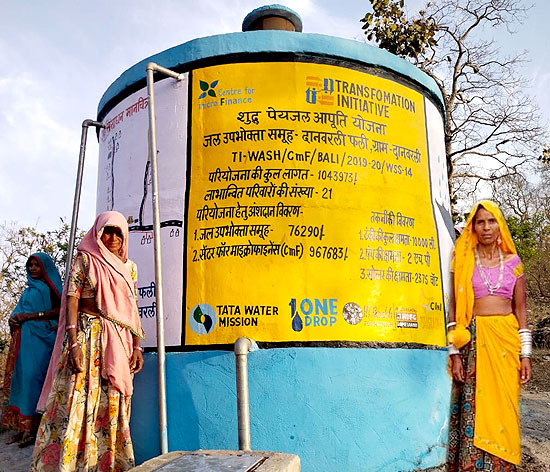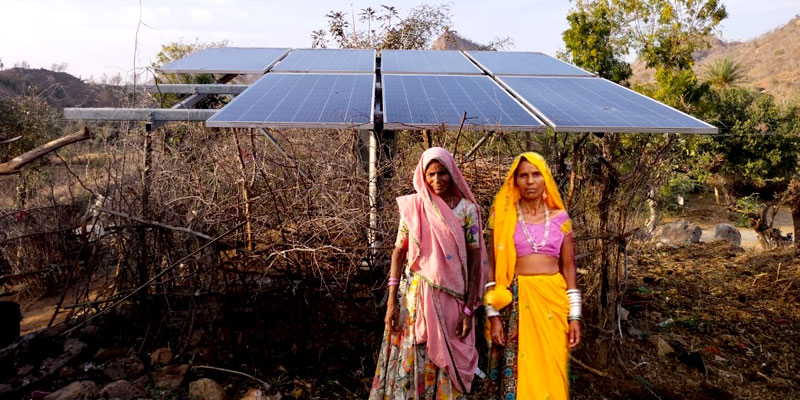
Danverli Fali is a small hamlet in village Danverli which is about 40 km from Bali block, Pali district in Rajasthan.. The habitation consists of 21 households scattered around the hilly terrain. Like many hamlets in the region, Danverli Fali faces an acute shortage of drinking water. With no sustainable source of potable water available, the villagers depend on hand pumps situated near the homes. However, the hand pumps do not produce sufficient water for their needs, and when summer peaks, would dry up completely. Then, the women of the village are forced to walk long distances to fetch water for their families. In this scenario, the quantity of water available takes precedence over its quality.
Stepping up for change
The lack of adequate water supply was an ongoing problem. The community had no idea how to address the issues, nor any guidance on how to go about making necessary changes to improve their quality of life. In 2017, a Centre for microFinance (CmF, as associate organisation of Tata Trusts) team anchoring Trusts’ WaSH (Water, Sanitation and Hygiene) initiative in Rajasthan, visited the hamlet to assess prevalent conditions. They held a community meeting to decide the immediate steps that could be taken to mitigate the water crisis.

Initiated in July 2016, the WaSH project was implemented by CmF in 50 villages in Bali block, Pali district and 150 villages in Pindwara, Abu Road block, Sirohi district, Rajasthan. The project was supported by Tata Trusts and One Drop Foundation, and aimed to provide safe, adequate and assured drinking water supply to individual households.
Perhaps it was because they were the most affected by the ongoing crisis, two women, Pappi Bai and Badali Bai, stepped forward to urge the WaSH team to support their community. In-depth discussions followed, and the Trusts’ team put forward the idea of the hamlet forming a Water User Group. Both Pappi Bai and Badali Bai were actively involved in the forming of the group and were elected to be the first president and treasurer, respectively.
Suddenly, everything was falling into place. Under the effective leadership of Pappi Bai and Badali Bai, the villagers collected Rs3,633 from each family, and the total amount of Rs76,290 was handed over as the community contribution towards the project.
The obstacle course
The project aimed to create a new water source by digging a borewell. A solar-powered submersible pump would pump the water to be stored in a water tank constructed on an elevated hillock nearby. The water from the tank would be distributed to individual households through dedicated pipelines.
A vendor was chosen to install the water supply and a work order was issued. For the Danverli Fali community, there was now the hope of getting drinking water at their doorsteps, all the year round. But soon, the vendor threw a spanner into the works; he began to push the community to change the construction site of the water tank. The project had been designed in such a way that the water tank would be built on elevated ground, thus ensuring the proper distribution of water to all the households in the village. The position of the water tank thus played a crucial part in the successful implementation of the scheme.
Having learnt the basics of a successful water supply scheme from their regular interaction with the CmF team, Pappi Bai and Badali Bai knew that if the water tank were not constructed where it was originally planned, water would not be distributed equally to all the stakeholders. This would create unnecessary conflict within the community. So, they took the bold step of removing the vendor from the project.
While their decision was initially lauded by the community, the resultant challenges caused the villagers to question their decision. No other vendor they approached showed any interest in taking up this project. The hilly terrain, the remote location and the difficulty in obtaining raw material for construction meant that getting vendors or skilled masons for a project has always been a challenge in this region. However, the women stood firm.
The sudden shift from implementing a water supply scheme to the sacking of the vendor happened so quickly that community trust started to splinter. While Pappi Bai and Badali Bai pleaded with the villagers to be patient, many of the members of the Water User Group began to drift away. As distrust increased, they began asking the women to return their contributions. Many of them even wanted to cancel their membership in the Water User Group. What was worse, drinking water schemes under the WaSH programme were being successfully implemented in other hamlets near Danverli Fali. The villagers felt cheated and took their ire out on the two women leaders. They even had a heated exchange with the WaSH team.
Leadership matters
Leadership is not just a matter of strategy and decision making. The mark of a true leader is the ability to go against the grain, to take risks. True leaders are driven by a cause greater than themselves, by the complete conviction that their actions are for the greater good. Inspiring leadership comes from a place of compassion and caring, and from leaders who stand tall in the face of adversity.
Pappi Bai and Badal Bai were truly the face of systemic change and determination. They stepped up to take charge of the chaos and calm inflamed feelings. In order to regain the community’s trust, they planned exposure visits, especially for those who wished to withdraw from the programme. They went door to door in their little village, having face-to-face talks with the families, explaining over and over the need to follow the process while implementing the project. They worked hard to keep the community united. After a long and harrowing waiting period of one year, their endeavours bore fruit – a new vendor showed interest in handling the project and was issued a work order to construct the water tank.
Success at last
But the women’s work was not over yet. They spent hours on the construction site, supervising the work and monitoring its progress. Their presence provided a check and balance that was necessary to keep the project on track. The women also kept track of payments and paid the final instalment only when the work was completed to their satisfaction. Finally, in November 2019, Danverli Fali had its very own water tank, and all 21 households have running water. The project was implemented at a total cost of Rs10,48,240, out of which Rs76,290 was community contribution. The remaining amount of Rs9,72,130 was provided by funds from the WaSH project.
The quality of the water from the borewell dug as part of this project is up to the mark, and the construction of the GLR and pipeline connections to each household have been done as per standards.
Sustaining efforts
Community ownership thus plays a crucial role in the success of social development projects and in their sustainability. The water supply scheme is now being maintained by the Water User Group at Danverli Fali. To make this scheme sustainable, the Water User Group introduced an operations and maintenance (O&M) policy. Each member of the Water User Group contributes a monthly fee of Rs100 towards O&M costs. The money is deposited in the bank account of the Water User Group to be used as and when necessary.
The Water User Group pays an honorarium of Rs300 per month to the operator of the scheme and an additional Rs100 to its record keeper. They maintain a cash book, an O&M register, grievance register, pump operations logbook and a meeting register for overall record keeping of operations. Other expenses include tank cleaning, repair or fixing of leakages, repair or replacement of valves, etc.
As of March 2022, the Water User Group has collected total O&M tariffs amounting to Rs21,970. An additional amount of Rs32,350 collected at the time of construction has also been added to O&M funds, which now totals Rs54,320. Currently, the Water User Group has a cash balance of Rs46,615 (cash in bank + cash in hand) after deduction of expenses incurred.
Women are important stakeholders in collecting, preserving and maintaining water resources. Thanks to the initiative, drive and leadership shown by Pappi Bai and Badali Bai, the community of Danverli Fali is now self-sufficient in drinking water. The duo has set an example for other women, and their hard work has demonstrated the value of community ownership in social and economic development programmes.
